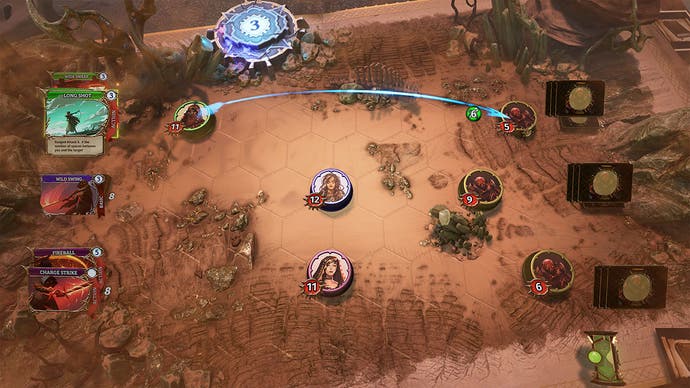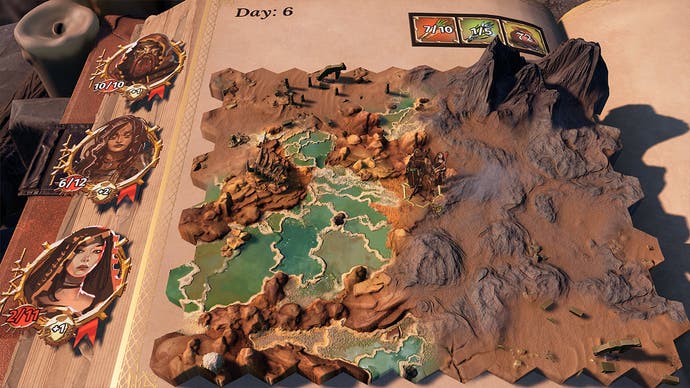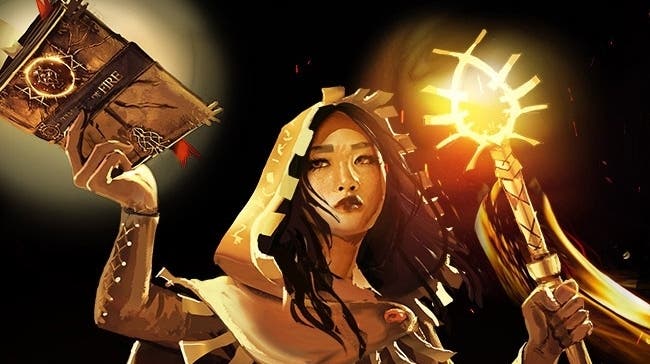Trials of Fire is an RPG, a card-battler and a lovely digital book
Tome raider.
Trials of Fire is a video game that is also a card game, a card game that is also an RPG, and an RPG that is also a book. This last piece is surprisingly important when it comes down to how lovely the whole thing is to interact with. The book is a great fiction. The game's title screen is stamped on its cover, and the early pages - the front matter, as they say, wonderfully, in the trade - is where you find tutorials and party stuff and all of that other front matter jazz. Adventures see you turning pages as you make choices, overworld maps or battle arenas rising out of the paper itself. When you want to go back or forward or muddle around with your equipment you can use bookmarks to get you there. Books, it turns out, even when they're digital books like this, are pretty great technology.
And the choice of a book isn't accidental. Trials of Fire takes notes from the likes of FTL as it tells procedural stories that unfold as you move from one node to the next. In Trials of Fire these nodes crop up as question marks as you shunt your party around a map, and each node gives you a bit of narrative - just a few paragraphs generally, but more than FTL or many of its followers opt for. Choices crop up quickly, and there are plenty of chances to scavenge for food or take a rest - hunger and tiredness being the things you're generally managing as you set off across the game's scarred landscape following any of its quests. There are also battles, growing in difficulty as you work your way closer to the story's goal. The battles, reader, are wonderful.

Each party you take out on an adventure is composed of three people - classes, I guess, ranging from spellcasters and archers to melee specialists. Each class comes with its own cards, three of which are dealt at the start of each turn. That means that you have nine cards to play with each round, although you won't be able to use them all. Some cards come with no costs, while others need a certain amount of Willpower - the game's version of mana - in order to be played. This can be built up by binning off cards, so there's a bit of tactical stuff in the mix from the very start.
Binning off cards also allows you to move your characters (there are also specific movement cards just for this), and movement's the second layer of combat to think about. While the cards detail your attacks and spells and buffs and whatnot, you also need to think about your positioning in the game's top-down battle arenas. Line of sight is important. Magic attacks come with specific areas of damage. Melee requires you to be right up next to the person you want to give a lamping to. It sounds complex, but it's actually very easy to get your head around. The fun it creates is complex, but in the best way. It's a laboratory of magical violence as you work out how to maintain tempo and unleash combos.

When the battle's done, you get to level one of your party, and the game's sharpness is on display here too. Levelling means you get a new card, but you also need to make room for it in your deck, which means getting rid of a card too. Decisions! Thrift!
Beyond this are main-quests and side-quests, equipment (more cards!) and loot and crafting. And there's always hunger and tiredness to take into account as you work out when and where to settle down for the night, and whether or not to risk a battle just to get some food. Trials of Fire is early access (presently only four classes are included, though four more are on the way) but it's already extremely slick, as you'd probably expect given that the small team working on it is built around a core of ex-Rocksteady staff. What I love about this game is how busy it already is. It's the work of a developer throwing everything into the pot. You could say, I guess, that they've thrown the book at it.

